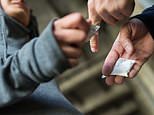Middle class drug users could lose their driving licences and PASSPORTS
Middle class drug users could lose their driving licences and PASSPORTS under Boris Johnson’s plan to ‘interfere with their lives’ as part of 10-year blitz on county lines drugs trade
The Prime Minister hit out at ‘lifestyle’ use of Class As by middle class users Accused them of believing they committed a ‘victimless crime’ with limited useSaid they were complicit in driving up drug-related crime across the UKPledged to bring in measures that ‘interfere with their lives’ to cut use
<!–
<!–
<!–<!–
<!–
(function (src, d, tag){
var s = d.createElement(tag), prev = d.getElementsByTagName(tag)[0];
s.src = src;
prev.parentNode.insertBefore(s, prev);
}(“https://www.dailymail.co.uk/static/gunther/1.17.0/async_bundle–.js”, document, “script”));
<!–
DM.loadCSS(“https://www.dailymail.co.uk/static/gunther/gunther-2159/video_bundle–.css”);
<!–
Middle class druggies could be stripped of their passports and driving licences under a tough new clampdown on Class A use, Boris Johnson has revealed.
The Prime Minister hit out at ‘lifestyle’ use of Class As by people who thought they were committing a ‘victimless crime‘ by only dabbling at weekends.
He said he wanted to bring in measures that ‘interfere with their lives’ as he accused them of being complicit in driving up drug-related crime across the UK.
Launching a 10-year blitz on county lines drugs gangs he said narcotics were causing ‘misery’ and rejected the idea of liberalising the law.
In a twin-track approach, resources will also be made available to help wean addicts off heroin, crack and other hard drugs.
Speaking to the Sun on Sunday Mr Johnson distinguished between addicts and social users of drugs.
‘I don’t want to stereotype them but I’m talking about lifestyle drugs. These people think it’s a victimless crime,’ he said.
‘It isn’t. The country is littered with victims of what’s happened. We are going to look at new ways of penalising them. Things that will actually interfere with their lives so we will look at taking away passports and driving licences.’
The Prime Minister hit out at ‘lifestyle’ use of Class As by people who thought they were committing a ‘victimless crime’ by only dabbling at weekends.
Launching a 10-year blitz on county lines drugs gangs he said narcotics were causing ‘misery’ and rejected the idea of liberalising the law.
The Prime Minister is expected to announce millions of pounds in extra funding for the police to tackle the gangs which exploit children to traffic drugs in provincial towns and cities.
The funding package will build on the success of Project Adder, a police pilot scheme which has already had a positive impact in disrupting county lines operations by allowing forces to devote more resources to covert operations.
Home Secretary Priti Patel has described the aim of the scheme as ‘cutting the head off the snake’ of criminal gangs.
The Government announced in July it would establish a new unit to help end illegal drug-related illness and deaths, as the second part of Dame Carol Black’s Independent Review of Drugs was released.
The first phase of the review, published in February last year, estimated there were 300,000 opiate or crack users in England, and around one million people using cocaine per year.
Meanwhile, drug misuse poisoning deaths are at a record high, having increased by nearly 80 per cent since 2012.
Dame Carol’s review also determined the illicit drugs market in the UK is worth £9.4 billion a year, but costs society more than double that figure.
If health considerations, the cost of crime and societal impacts are combined, the total cost of illegal drugs is £19 billion annually.
County lines drugs operations have spread across Britain in recent years, with criminal gangs exploiting vulnerable youngsters to deliver drugs to communities outside the major conurbations.
They often operate across local authority boundaries, coercing children to move drugs and cash for them and offering ‘services’ such as door-to-door deliveries. In some cases youngsters are forced into debt-bondage with a gang, making it impossible for them to escape.
In others, gangs take over the home of a vulnerable person and use it as a base for their operations in a practice known as ‘cuckooing’, which is set to be made illegal.
The drugs crackdown is part of a wider law and order package to be unveiled next week, including a renewed emphasis on the rights of victims. There will also be new efforts to drive up prosecution rates for rape and sexual assaults.
Ministers are expected to unveil a change in the law to ensure rape victims have the automatic right to give evidence by video link to avoid the trauma of having to face their tormentor in court.
And the Daily Mail revealed last week that a Prisons White Paper will give prison governors new powers to hand out fast-track punishments to convicts guilty of low level offences. Tougher measures will also be taken to cut off the supply of drugs to jails, which remains a major challenge.
![]()


